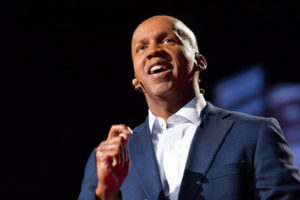
Bryan Stevenson
America’s harsh criminal justice system, the mass incarceration of mostly black people, and the use of private prisons are well-known. In such a system, Bryan Stevenson, through his Equal Justice Initiative (EJI), has won reversals, relief, or release from prison for over 135 wrongly condemned prisoners on death row and won relief for hundreds of others wrongly convicted or unfairly sentenced.
Bryan Stevenson is a widely acclaimed public interest lawyer who has dedicated his career to helping the poor, the incarcerated, and the condemned in the US. He is the founder and Executive Director of the Equal Justice Initiative, a human rights organization in Montgomery, Alabama. Under his leadership, EJI has won major legal challenges eliminating excessive and unfair sentencing, exonerating innocent death row prisoners, confronting abuse of the incarcerated and the mentally ill, and aiding children prosecuted as adults.
Bryan and his staff have argued and won multiple cases at the US Supreme Court, including a 2019 ruling protecting condemned prisoners who suffer from dementia and a landmark 2012 ruling that banned mandatory life-imprisonment-without-parole sentences for all children 17 or younger.
Bryan has initiated major new anti-poverty and anti-discrimination efforts that challenge inequality in America. He led the creation of two highly acclaimed cultural sites which opened in 2018: the Legacy Museum and the National Memorial for Peace and Justice. These new national landmark institutions chronicle the legacy of slavery, lynching, and racial segregation, and the connection to mass incarceration and contemporary issues of racial bias.
Bryan is a graduate of the Harvard Law School and the Harvard School of Government. He is also a Professor of Law at the New York University School of Law.
Bryan’s work has won him numerous awards, including the prestigious MacArthur Foundation “Genius” Prize; the National Medal of Liberty from the American Civil Liberties Union; the Martin Luther King Jr. Nonviolent Peace Prize; the Olaf Palme Prize in Stockholm, Sweden, for international human rights; and the Right Livelihood Award. In 2015, he was named to the Time 100 list recognizing the world’s most influential people. He was also named in Fortune’s 2016 and 2017 World’s Greatest Leaders list. His 2012 TED talk entitled “We need to talk about an injustice” has been viewed more than 7.25 million times, probably the highest for any TED talk.
He is the author of the critically acclaimed New York Times bestseller, Just Mercy: A Story of Justice and Redemption, which has been awarded several honors, including the American Library Association’s Carnegie Medal for best nonfiction book of 2015 and a 2015 NAACP Image Award. Just Mercy was adapted as a major motion picture.
Just Mercy tells the story of EJI, from the early days with a small staff facing the nation’s highest death sentencing and execution rates, through a successful campaign to challenge the cruel practice of sentencing children to die in prison, to revolutionary projects designed to confront Americans with our history of racial injustice.
In spite of all the injustices that Bryan has seen at close quarters, he still remains hopeful and positive in his outlook. In a December 2020 conversation with Krista Tippett (Onbeing.org), this is what he said:
I am persuaded that hopelessness is the enemy of justice; that if we allow ourselves to become hopeless, we become part of the problem. I think you’re either hopeful, or you’re the problem. There’s no neutral place. We’ve been dealing with injustice in so many places for so long. And if you try to dissect why is this still here, it’s because people haven’t had enough hope and confidence to believe that we can do something better. I think hope is our superpower. Hope is the thing that gets you to stand up, when others say, “Sit down.” It’s the thing that gets you to speak, when others say, “Be quiet.”
As Krista Tippett puts it, “How to embrace what’s right and corrective, redemptive and restorative — and an insistence that each of us is more than the worst thing we’ve done — these are gifts Bryan Stevenson offers with his life. He’s brought the language of mercy and redemption into American culture in recent years, growing out of his work as a lawyer.”
Bryan has remained a bachelor and has stated that his career was incompatible with married life.
Background: For this story, I have drawn heavily from the website of the Equal Justice Initiative.
